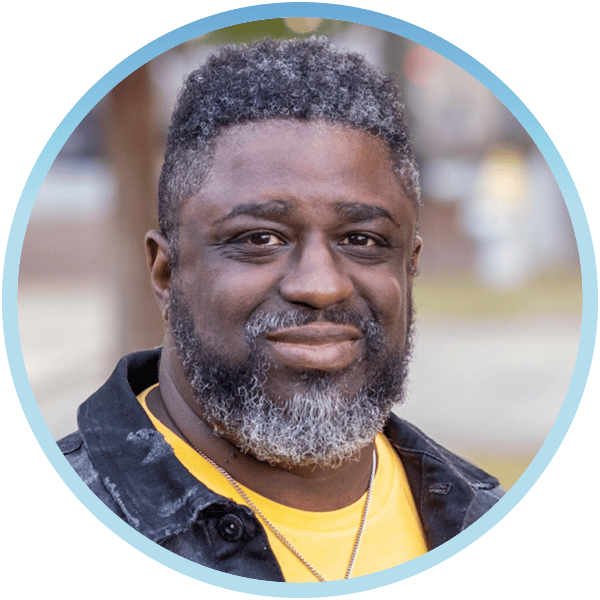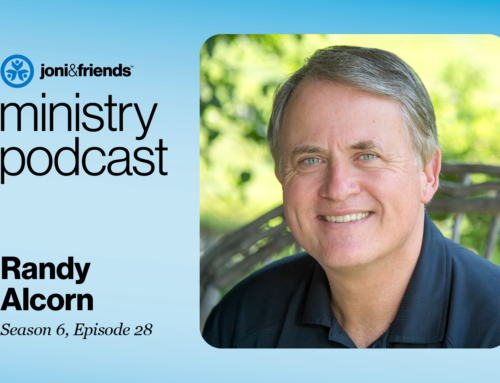Meet “The Autism Pastor,” Dr. Lamar Hardwick
Subscribe to the Joni and Friends Ministry Podcast
Lamar Hardwick is a husband, father, advocate, and lead pastor at a church in Georgia. He writes and speaks on the topic of disability, especially autism.
He joins the podcast to talk about his life, faith, and how his autism diagnosis at the age of 36 helped him understand why he’d felt like an outsider for much of his life.
What is it like to grow up with undiagnosed autism?
As early as age seven, Pastor Lamar recalls noticing significant differences between himself and his peers. He began to feel like the world was an inside joke that he didn’t get.
“We’ve all heard this saying that 90% of all communication is non-verbal, right? Well, for someone like me, I like to say I don’t have the translator in my head to understand body language, voice intonation, and facial expressions,”
Lamar

While he didn’t know how to fit in, as a child Lamar learned to avoid standing out; he mimicked behaviors and pretended to understand things he really didn’t. Still, socializing proved difficult. He struggled to make friends and turned to reading as a way of understanding the world.
As a teenager, Lamar, like many teens and twentysomethings with undiagnosed developmental disorders and mental health issues, turned to substances to cope.
“As someone on the spectrum, I have social anxiety. So I’m not always a great initiator in conversations. It’s kind of hard to figure out what to say, and when to fit it in. I’m not very good at small talk,”
Lamar
Lamar first used drugs and alcohol around eighth grade, as social awareness and pressures increased. Substances helped Lamar gain social acceptance and feel more in control of his social life, at least for the short term.
“Drugs and alcohol alter your natural state. What I found out very quickly is drugs and alcohol made me more of all the things that people said I should be—more outgoing, more fun. And so the payoff was that it made me feel more accepted, more cool.”
Lamar
Pastor Lamar likens his teen years to the story of Jonah. Lamar ran away from God, depending on drugs and alcohol to try to be someone he wasn’t. And like Jonah’s, Lamar’s disobedience affected more than just his own life.

“Jonah ran away from the Lord and headed for Tarshish. He went down to Joppa, where he found a ship bound for that port. After paying the fare, he went aboard and sailed for Tarshish to flee from the Lord.
Then the Lord sent a great wind on the sea, and such a violent storm arose that the ship threatened to break up.”
Jonah 1:3–4
When Jonah got on a ship to run away from God, everybody on the ship suffered from the storm Jonah brought on.
Have you ever tried to run away from God?
For Lamar, the Jonah story struck home during his freshman year of college when he and some friends (including his then-girlfriend, now wife) got into a serious car accident. The car spun multiple times across traffic. Lamar recalls:
“The whole time the car was spinning, I could hear God talking to me. So when the car finally stopped, I got out and was on my knees weeping. The paramedics thought I was in shock. It wasn’t so much because of the accident. It was that I finally said, ‘Okay, I hear you, God. I have to do better. I have to turn my life around because it’s impacting people around me that I love. Amen.’”
God used the accident to beckon Lamar toward ministry as he came to a realization:
“If something as simple as me being disobedient impacts people in a negative way, what would happen if I actually stopped running from God and actually started obeying God? How much of an impact can I have?”
Diagnosis: Before and After
Before receiving his diagnosis, Pastor Lamar lived without an explanation for many of his struggles. For decades, he dealt with negative labels: weird, weak, arrogant, standoffish. Learning more about autism, and his brain wiring, brought relief.
Since childhood he had carried the burden of wondering what he’d done to make multiple important relationships end. As a child, he’d blamed himself; the diagnosis helped him set this burden down. At the same time, learning about his autism caused Lamar grief; he had to let go of the person he thought he was and get to know who he really was for the first time.

When it comes to relationships, Lamar points to his wife, Isabella, as his rock. Lamar and Isabella started dating at age 18, well before Lamar’s diagnosis, and have now been married for over 20 years. Isabella comes from Malawi and has an extroverted personality, opposite from Lamar’s. For years the couple assumed that cultural and temperamental differences accounted for the awkwardness that sometimes arose between them.
“Our assumptions going into it was, ‘We’re just going to have to work really hard at understanding each other and make this work because we really like each other.’ And then eventually, obviously fell in love with each other. But we went from the beginning knowing that we had to work because we just saw life differently.”
Lamar
For Lamar and Isabella, the diagnosis helped to explain a lot of things. As they developed deeper understanding and new tools for relating to one another, they build upon the existing foundation of their relationship. This process has benefited both of them and has only made their marriage stronger.

What is it like to live with autism as an adult?
In their marriage and work, Lamar and his wife have stayed close to the Lord and entered into ministry. To this day, living with autism, brings unique challenges and opportunities. For one, adults with autism often get less grace than they did as children because people expect them “to know better.” While children on the spectrum often get called “shy,” teenagers and adults with autism can face harsher judgment.
As a pastor, Lamar faces especially high social scrutiny and expectations. When he was diagnosed, he spent two years with a therapist, both untangling complicated parts of his life, and getting tools to help him cope with social anxiety and learn to connect with people more effectively.
“I was afraid that I might offend someone with my own body language or facial expressions that often don’t mirror the environment. People liked the way I preach, but off the stage, they felt like I was a totally different person. On the stage it’s just me talking and I can communicate very well what I want to get across, but I really struggle with social interactions off the stage.”
Lamar
For Lamar, key strategies for connecting with people have emerged with time, therapy, and practice. In conversations, for instance, he has learned the power of asking questions and listening to people well. At events, he often assigns himself a role (hand out drinks, pass out handouts) to have a focus. Sometimes he prepares a script for himself and keeps a log of questions he gets asked frequently so he can be prepared to respond to similar inquiries in the future.
While he’s had to work hard to overcome difficulties related to his autism, Pastor Lamar also points to strengths. For example:
- Repetitive behavior, which can be seen as rigid, can translate into productive focus.
- A high need for routine can lead to a high level of skill at creating systems.
- People with autism often see patterns well.
As a pastor, understanding patterns at church and seeing trends coming around the corner has proved useful. So has his interest in history. As a child, Lamar used to read encyclopedias.
Today he still loves to read and research topics in depth. This interest now serves him well as he studies and prepares sermons.

How can churches and communities support people with autism?
Cultivating understanding that people often have invisible disabilities can make a community more inclusive and gracious.
“We are called to be people of grace, but I think that we don’t often practice that very well,”
Lamar
But when people extend grace to one another and create an environment where it’s okay to be honest and transparent, a church or community can become more authentically inclusive.
“The Word became flesh and made his dwelling among us. We have seen his glory, the glory of the one and only Son, who came from the Father, full of grace and truth.”
John 1:14
As part of the process of reaching an autism diagnosis, Lamar asked himself the question: “What do people experience when they experience me?” The answer wasn’t what he’d previously assumed. Now Pastor Lamar challenges the church to ask the same question of itself:
What do people (especially people with disabilities) experience when they encounter the church?
When people with disabilities are absent from the body of Christ, it shows that their experience of the church is not full of grace, and not inclusive. Pastor Lamar has this message for the church:
“Let’s really practice more grace and create a space where people can tell us what their real experience with us is. And if it’s not good, then we use that as a way to sharpen ourselves and to adapt.”

The Autism Pastor
As a pastor and autism advocate, Dr. Lamar Hardwick is creating awareness and promoting acceptance to change our culture for the better. Learn more about his books and ministry.











